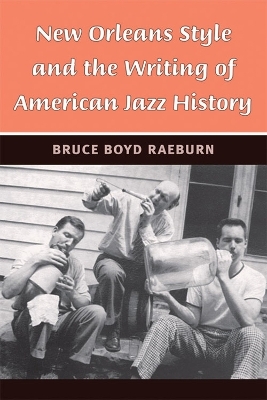
New Orleans Style and the Writing of American Jazz History
Seiten
2009
The University of Michigan Press (Verlag)
978-0-472-03321-8 (ISBN)
The University of Michigan Press (Verlag)
978-0-472-03321-8 (ISBN)
Studies the development of New Orleans jazz and its effect on jazz history. This title provides the story of how New Orleans jazz came to be recognizable as a discrete style and how that recognition affected the writing of American jazz history. It traces the conceptualization of jazz history derived from ""Jazzmen"" to its refuge in New Orleans.
This is a fascinating and insightful study of the development of New Orleans jazz and its effect on jazz history. ""New Orleans Style"" is the story of how New Orleans jazz came to be recognizable as a discrete style and how that recognition affected the writing of American jazz history. The men and women who participated in the awakening of American jazz scholarship were partisans of a community of 'hot' record collectors, whose interest in the origins of jazz was a foregone conclusion. An international network of collectors took shape between the 1920s and 1934, providing a mechanism for the circulation of historical information on jazz, which then became the basis for the emergence of a jazz literati writing for magazine such as ""Down Beat"", ""Esquire"", ""The New Republic"", and ""Jazz Information"".Inspired by their love for the music and emphasizing 'New Orleans style', writers like Charles Edward Smith and William Russell explained in work such as ""Jazzmen"" (1939) and ""The Jazz Record Book"" (1942) that jazz was 'born in New Orleans'. Raeburn traces the conceptualization of jazz history derived from ""Jazzmen"" to its ultimate refuge in New Orleans and its integration into the cultures which it celebrated. The result is an essential work of jazz criticism that will fill a major gap in the field's literature.
This is a fascinating and insightful study of the development of New Orleans jazz and its effect on jazz history. ""New Orleans Style"" is the story of how New Orleans jazz came to be recognizable as a discrete style and how that recognition affected the writing of American jazz history. The men and women who participated in the awakening of American jazz scholarship were partisans of a community of 'hot' record collectors, whose interest in the origins of jazz was a foregone conclusion. An international network of collectors took shape between the 1920s and 1934, providing a mechanism for the circulation of historical information on jazz, which then became the basis for the emergence of a jazz literati writing for magazine such as ""Down Beat"", ""Esquire"", ""The New Republic"", and ""Jazz Information"".Inspired by their love for the music and emphasizing 'New Orleans style', writers like Charles Edward Smith and William Russell explained in work such as ""Jazzmen"" (1939) and ""The Jazz Record Book"" (1942) that jazz was 'born in New Orleans'. Raeburn traces the conceptualization of jazz history derived from ""Jazzmen"" to its ultimate refuge in New Orleans and its integration into the cultures which it celebrated. The result is an essential work of jazz criticism that will fill a major gap in the field's literature.
Bruce Boyd Raeburn is Curator of the Hogan Jazz Archives at Tulane University.
| Erscheint lt. Verlag | 30.3.2009 |
|---|---|
| Reihe/Serie | Jazz Perspectives |
| Zusatzinfo | 1 halftone |
| Verlagsort | Ann Arbor |
| Sprache | englisch |
| Gewicht | 493 g |
| Themenwelt | Kunst / Musik / Theater ► Musik ► Jazz / Blues |
| ISBN-10 | 0-472-03321-2 / 0472033212 |
| ISBN-13 | 978-0-472-03321-8 / 9780472033218 |
| Zustand | Neuware |
| Haben Sie eine Frage zum Produkt? |
Mehr entdecken
aus dem Bereich
aus dem Bereich
zur politischen Ästhetik des Jazz
Buch | Hardcover (2023)
Phillip Reclam (Verlag)
CHF 49,90
Die Geschichte des Jazz in Deutschland
Buch | Softcover (2021)
Reclam, Philipp (Verlag)
CHF 31,90


